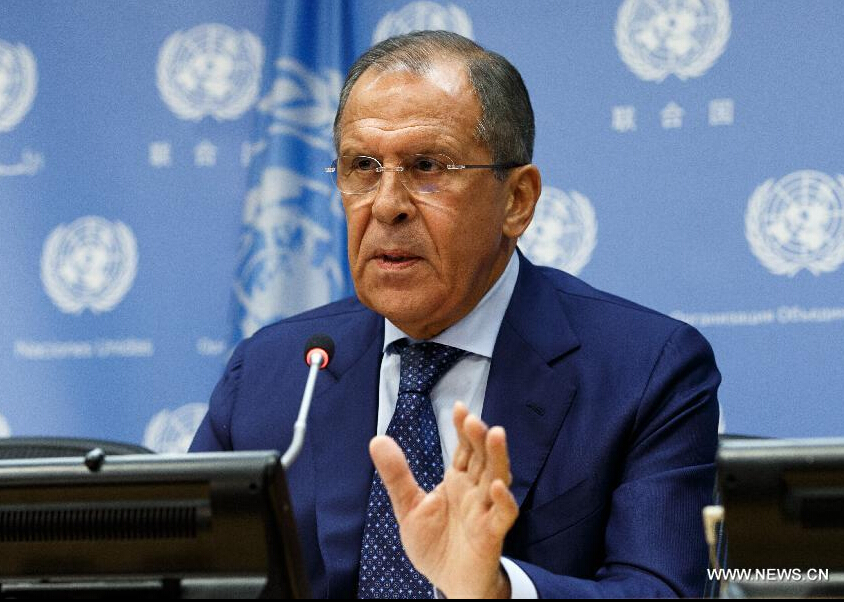Week of Russian bombing: gains and loses
- By Sumantra Maitra
 0 Comment(s)
0 Comment(s) Print
Print E-mail China.org.cn, October 8, 2015
E-mail China.org.cn, October 8, 2015
|
|
|
Russian Foreign Minister Sergey Lavrov speaks during a press conference at the United Nations headquarters in New York, Oct. 1, 2015. Russian Foreign Minister Sergey Lavrov on Thursday strongly defended his country's bombing campaign in Syria, saying it is targeting terrorist groups and not aimed at keeping Syrian President Bashar al-Assad in power. [Xinhua/Li Muzi] |
Readers who have read my previous analysis of the Russian intervention in Syria would know that I am ambivalent towards the entire scenario. Personally, I believe that interventions are needed at times when there is a choice between order and chaos. However, it is preferable to watch on a case by case basis. Now, we are entering into a week of Russian intervention in Syria, its biggest outside the former Soviet Union in over a quarter of a century. Russian buildup was so fast that it led analysts to presume that Russia was panicking, thinking that the Syrian regime was falling. Recent Western intelligence reports however suggest that Russian intervention was a long term plan with Iran. So, what does Russia gain and lose and what has it achieved?
Firstly, let's analyze Russia's gains. For decades Russia has been relegated to a second grade regional power, one with a massive armory, but one that is mostly obsolete or outdated. That began to change during the Russian Georgian war in 2008. Russian generals realized it was time to update the hardware and a costly rearmament was started especially in the command and control sector. With the turmoil of the Middle East came the conundrum of losing Russia's only military facility outside the former Soviet Union and a warm water port in the Mediterranean. Russia doesn't possess a natural alliance system like the West, or the technological feats of China in South China Sea. So, it had to rely on the age old Soviet port in Tartus, Syria, their only Middle Eastern ally.
This intervention has given Russia the opportunity to prop up their only client and a chance to preserve their only warm water port. Most importantly, it will give Russia a chance to test its weaponry. Battle and combat experience is something no amount of military exercises can replace. This opportunity for Russia, where they don't have to actually send in ground troops, at least not yet, is something which only the Western alliance does, and something Russia long wanted to test and emulate as a strategy.
It also gives Russia a chance to be in the same battle arena as the other powers, if not necessarily in the same bombing theatres. The American and Russian bombing campaigns are far apart, but there have been instances where Russian bombers came only 20 miles next to a Western jet. The amount of surveillance Russia can gather will be enviable from a strictly military perspective. Force operations and maneuvers, reaction time, radar positions, are all that Russians will try to gather about the Western forces.







Go to Forum >>0 Comment(s)